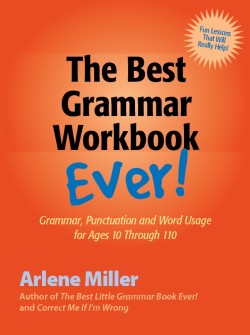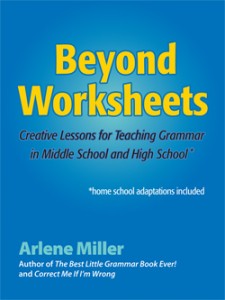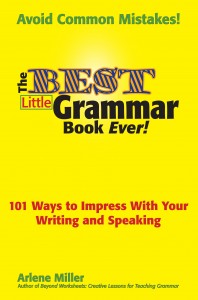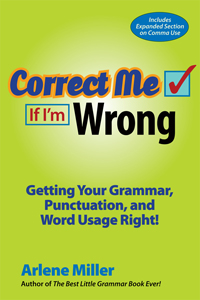
Welcome to the first Grammar Diva Question and Answer blog post! Thank you if you sent in questions, and continue to send in questions for our next question and answer post! Here we go…
Question: When is it correct to use a comma or an em dash before “such as” or “including”?
Answer: Well, as with most other things grammarish, there is a bit of disagreement. However, here is what I think. The em dash is probably not the appropriate punctuation to use with such as or including. The em dash is usually used to indicate a change in thought. The comma is more appropriate here. It boils down to restrictive versus nonrestrictive information. If what comes after such as or including is additional information or examples that are not necessary to the meaning of the sentence, use a comma. If the information following such as or including is necessary to the meaning of the sentence and explains or limits what is already written, do not use a comma. Here are some examples:
- I love all citrus fruits, such as oranges and grapefruit.
- Fruits such as mangoes and melons can cause allergies in some people.
- Please pack toiletries including shampoo, soap, and toothpaste for the trip, since they will not be provided to you.
- The romance languages, including French and Italian, have a beautiful sound.
Question: Are these commas necessary?
- The company cited sales and marketing efforts, and human resource management as areas that need attention.
- See what works best, based on your business needs.
- Taking steps to secure your data can strengthen not only your business, but also your relationships with customers.
Answer: I don’t think any of the commas in the above sentences are necessary. In the first sentence, there is no comma rule except “to avoid confusion.” I don’t think the sentence would be confusing without the comma. In the second sentence, based on your business needs appears to really be a necessary part of the information. I would not use a comma. In the third sentence I might use a comma, employing the rule that there is often a comma between contrasting information.
- Broadband, or high-speed, Internet access can make your business more competitive.
Answer: I would use a comma here for sure. If high-speed is another term for broadband, the comma is necessary. Without the comma, the sentence would imply that it was one or the other.
Question: If an acronym stands for a plural term, do you need to add an “s” to make the acronym plural?
- Location-Based Services (LBS) help small businesses attract new customers. Using LBSs can jumpstart your sales.
Answer: I would say NO. The plural is already there (services). Putting the s at the end doubles the plural.
Question: What are the rules for use of a colon to introduce a list? When are periods used at the ends of list items?
This guide will help you learn ways to use technology to build your business. It includes:
- Tips for increasing productivity.
- Strategies for attracting customers.
- Advice for improving customer service.
Answer: In the above example, there should be no colon, since the items in the list complete the sentence It includes. The periods in this case are fine because each item completes the sentence. Use a colon to introduce a list when the introduction is a complete sentence, whether the list is horizontal or vertical. Here are some examples:
Please bring a jacket, a blanket, and a flashlight.
Please bring the following items: a jacket, a blanket, and a flashlight.
Please bring
- a jacket.
- a blanket.
- a flashlight
Please bring the following items:
- jacket
- blanket
- flashlight
Please bring
- a jacket,
- a blanket, and
- a flashlight
All of the above examples are correct.
Question: Is is more important or more importantly and why?
Answer: More important means “what is more important.” More importantly means “in a more important way.”
- More important, we should vote for candidates who agree with our views on growth.
- She treated her pets more importantly than she treated her children.
Question: We hear someone say, “That is so like her” or “That sounds like her.” But why isn’t it “That is so like she”? Or “sounds like she”?
Answer: Like is a preposition. Therefore, the noun or pronoun that comes after it is its object and is in objective case (me, him, her). So, “that is so like her” is correct. “It sounds like her” is also correct. If you are using a subordinating conjunction (as, as if, as though), rather than a preposition (like), it would be followed by a clause (subject and verb), even if the verb were understood. Here are some examples:
- She sings like me.
- She sings as I sing.
- She acts like a princess.
- She acts as a princess acts.
- She acts as if she were a princess.








Hello Arlene,
Great website. In the sentence, “Fruits such as mangoes and melons can cause allergies in some people,” you want a comma before “such” and after “melons” to separate the phrase from the rest of the sentence. You really don’t need the information after the word “Fruits” in order to derive the correct meaning.
I used that as an example for where the commas are incorrect. Everyone knows what fruit is. I wasn’t giving an example of fruits. I was giving an example of the fruits that can cause allergies, which isn’t all fruits — at least not in the meaning of my sentence. I was defining the fruits, and thus putting commas in would be incorrect. I was using the phrase as a restrictive phrase. You would lose the meaning of the sentence if you took that phrase out. Which fruits?????
Great post Arlene (do I need a comma here?). Although I know all the rules I sometimes add a colon where it’s not necessary. I can also get carried away with commas sometimes. Anyway, Hag Sameach and all the best from the Land of Milk & Honey.
Thank you, Avril — and yes, you do need a comma there!
S-V Agreement for gerunds as subjects:
Nouns and pronouns usually form the subject[s] of sentences. In a sentence, nouns/pronouns should agree with verbs in number and person. The rules of Subject-Verb agreement are well-known. However, other parts of speech can also form the subject[s] of a sentence. Could the following rules be used when a Verb forms the subject of a sentence?
Verb as a subject:
A gerund is verb which can form the subject of a sentence. A gerund is the –ing form of a verb. Examples of gerunds are ‘running’, ‘writing’, etc.
[Rule] [1] When a sentence begins with a gerund the verb that follows is singular.
This is perhaps because the gerund usually does not take the suffix –s and so the plural cannot be formed. We cannot say ‘runnings’, ‘smokings’, etc. [The plural is formed by adding –s to a singular: boy-boys; girl-girls].
Hence the verb that follows a gerund is always singular.
Smoking IS prohibited.
Running IS easy for animals.
Compare,
Animals FIND it easy to run.
Exception:
Some gerunds do take the suffix -s and they take the plural verb.
The writings of Dickens HAVE been popular for long.
However, when two gerunds form the subjects of a sentence they usually follow the accepted rules. For example,
A] Two gerunds joined by the conjunction ‘and’ take the plural verb.
Smoking and drinking ARE prohibited here.
B] If two gerunds are joined by the conjunction ‘or’, or ‘nor’ the verb usually agrees with the nearer.
Urinating or vomiting in public IS offensive.
C] When using subordinate clauses with a pronoun as subject, the verb agrees with the antecedent gerund to which the pronoun refers.
Running away from danger is preferable because it ENABLES us to fight again., etc.
Thank you for the comment. It is correct and informative!
I would like to know the difference between “would+base form” and”used+base form”
I don’t quite understand the question…please clarify or if anyone else knows the answer, please comment!
“would+base form” is not used with state verbs such as “live, have etc.” However, “used to “can be used to talk about our past habits, states and actions with state and action verbs. For example, I used to live in a house. I live in a flat now.” In this sentence “would” cannot be used because it is a state verb. You can say “Father used to/would take us to the zoo when we were children.” For “take” is an action verb.
Thanks so much for the answer. These are terms I am not familiar with. But now I know. Thank you for teaching me something new!